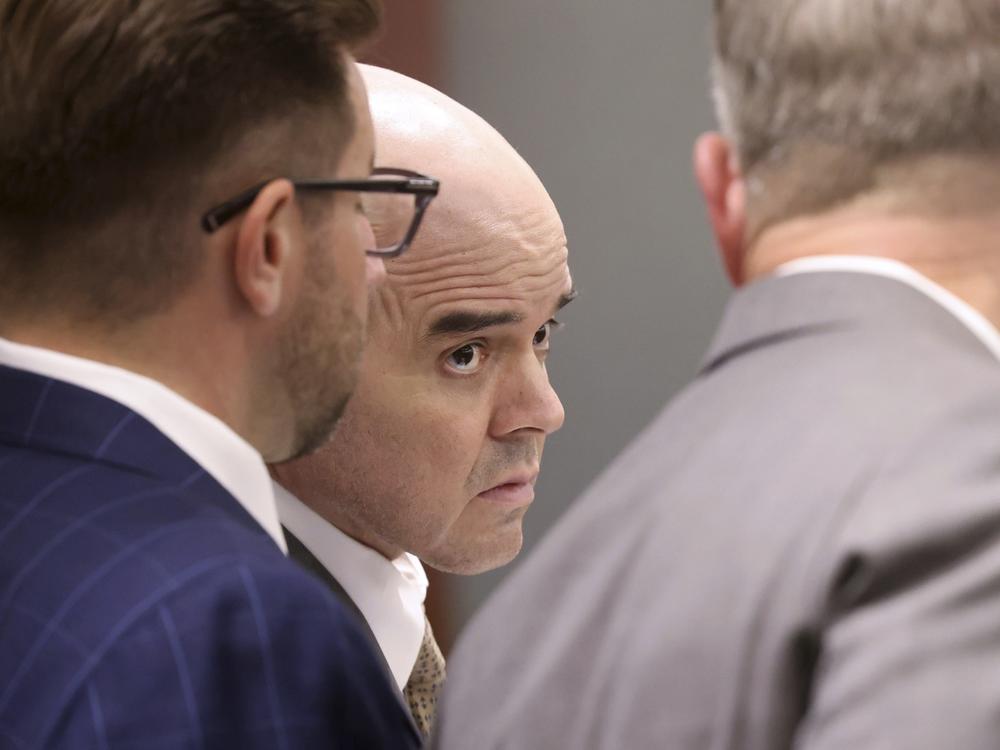Section Branding
Header Content
Former elected official found guilty of murdering Las Vegas veteran reporter
Primary Content
Two years ago, Las Vegas was shocked by the savage stabbing of one of the city's best-known journalists, Jeff German. That shock was compounded when police arrested an elected county official. Now a jury has found that former official, Robert Telles, guilty of first-degree murder.
At the time, Telles was the Clark County Public Administator, whose office oversees the disposition and transfer of deceased people's assets in the absence of next of kin or a valid executor. But he lost his bid for re-election in the Democratic primary in June of 2022, after the Las Vegas Review-Journal published critical articles about him. The articles reported he'd had a romantic relationship with a subordinate, and had created a "hostile" work environment.
German, the veteran investigative reporter behind those stories, continued to request public documents from Telles' office even after his primary election defeat, and prosecutors say that's when Telles resolved to kill German.
"He murdered him because Jeff's writing destroyed his career, it destroyed his reputation, it threatened probably his marriage, and exposed things that even he admitted that he didn't want the public to know," Deputy District Attorney Christopher Hamner said in court. "And he did it because Jeff wasn't done writing."
German was stabbed to death outside his Las Vegas home on Sept. 2, 2022. Shortly before, surveillance video captured images of a person wearing an orange work shirt or vest and large straw hat walking toward German's house, and police later found a cut-up straw hat in Telles' home. They also found evidence that Telles had "cased" the address with online map searches, and that he'd shut off his phone and was unreachable during the murder.
Perhaps the most damning evidence was the discovery of Telles' DNA underneath the slain journalist's fingernails.
During the two-week trial, Telles' defense team cast doubt on the reliability of the evidence. Telles himself took the stand, saying he'd gone to a gym that day, and that he believed the evidence against him was planted by the police.
His attorney, Robert Draskovich, raised a less sinister theory.
"Oftentimes, we suffer — especially law enforcement — from what's called 'confirmation bias,'" he said during closing statements. "You reach a judgment, sometimes early on in a case, and you work backward to confirm what the judgment that you've arrived at at the beginning should be, at the end."
The defense also raised doubts about a video of a maroon SUV passing close to the murder site, which prosecutors say was identical to one driven by Telles. In his closing arguments, Draskovich froze the video and zoomed in on the shadowed and indistinct profile of the driver.
"What's that look like on the top of the head? I submit to you that looks like hair," he told the jury. Telles is completely bald.
During its 12 hours of deliberation, the jury asked the judge for technical support to zoom in on images on the computer they were given containing video evidence.
As Telles stood to hear the verdict, he shook his head. The jury also found the murder to be "willful, deliberate and premeditated," "elder abuse" and "by means of lying in wait," which are special verdicts under Nevada law.
German was known in Las Vegas as a sometimes "gruff" and dogged reporter, who dug into government corruption and organized crime.
"Ninety percent of his life was being a reporter," says Arthur Kane, a colleague at the Review-Journal, who wrote a book about German's life and death, The Last Story. "Whenever I asked him 'When are you going to retire?' he's like, 'I'm not," says Kane. "And he didn't."
As to the verdict, Kane says, "The best we can hope for is that it may be a warning to other people who decide to target journalists for their work."
The jury sentenced Telles to life in prison with the possibility of parole after 20 years.

